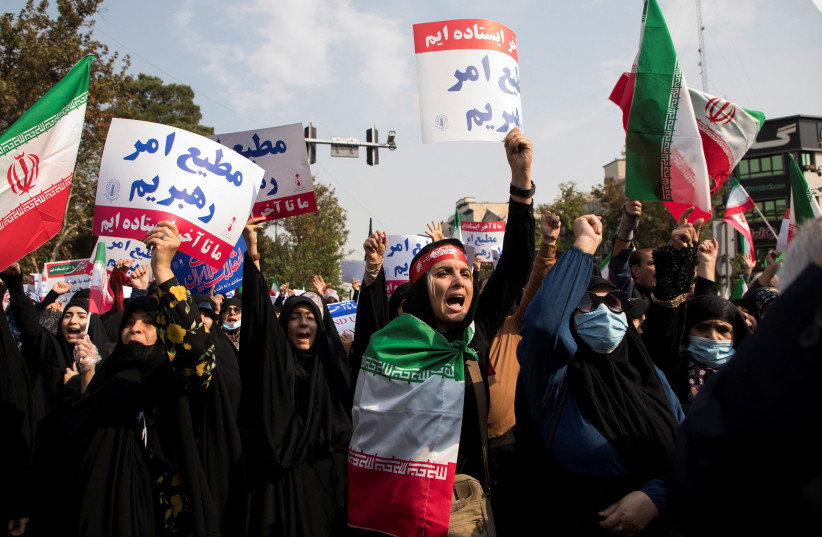Can Iranians overthrow the Islamic Republic regime?
Regime change in Iran will only be possible if the “silent majority,” including many traditional pragmatists, buy into revolution, and it will not succeed based merely on liberals and diaspora Iranians, an INSS position paper said.
Published by Iran expert Raz Zimmt on Monday, the position paper gives one of the most thorough and updated analyses to date of the complex social mosaic making up Iran, specifically following the September 2022-spring 2023 protest movement.
Zimmt noted that officials and organizations in the US and Israel like to team up “with pro-Western and pro-Israeli secular organizations that strive for a revolution,” in Iran, which “ might appear intuitive and evident, yet it remains uncertain whether these groups possess the capacity to effect the desired transformation.
“The prospects of political change in Iran hinge significantly on the capability to construct an inclusive coalition that encompasses sectors with varying and even contradictory perspectives,” said the INSS paper.
Further, the paper said, “A notable weakness within the recent wave of protests was the absence of considerable social and economic population segments, including workers from major industries and the service sectors, who refrained from participating in the predominantly teenager and university student-led demonstrations.
 Iranian women chant during a protest condemning the Shiraz attack and unrest in Tehran, Iran October 28, 2022 (credit: WEST ASIA NEWS AGENCY/REUTERS)
Iranian women chant during a protest condemning the Shiraz attack and unrest in Tehran, Iran October 28, 2022 (credit: WEST ASIA NEWS AGENCY/REUTERS)“Challenging the regime’s stability in a substantive manner necessitates the establishment of a comprehensive national coalition. This coalition should be able to unite diverse groups such as workers and pensioners, who prioritize economic enhancement and social equity, alongside politically astute groups like students who stand as advocates for political and civic liberties,” wrote Zimmt.
He continued, “Such a coalition must embrace the intricate tapestry and variety of Iranian society. Distinguishing between ‘the regime’ and ‘the people’ is insufficient, as a populace exceeding 85 million cannot be approached as a uniform group.
Iran has a diverse population: The traditionalist majority will need to support regime change
Next, he said, “Iran is composed of a diverse population encompassing deeply religious believers and secular individuals. It includes supporters, critics, and adversaries of the regime; young liberal students as well as young anti-Western hardliners; urban-educated middle classes aspiring for change, and traditional middle and lower classes who may prefer maintaining the status quo, especially without resorting to violent and revolutionary means.”
“An Iranian citizen can observe Ramadan and also commemorate Cyrus the Great Day, oppose the obligatory hijab, and simultaneously view the hijab as a meaningful religious, national, and societal emblem. They can both…voice disapproval of Iranian aid to Syria while opposing American sanctions. They may dissent from the regime’s stance on destroying Israel and at the same time object to the policies of the Israeli government,” INSS added.
Moreover, “An oversimplified analysis neglecting the diversity of Iranian society is a formula for misguided assessments that often lead to the adoption of failed strategies.”
Zimmt wrote that, “In recent years, Israel itself has not concealed its intentions to undermine the Iranian regime’s stability.”
In late 2021, Israel’s security services devised a strategy “where pressure from the Iranian public, though not inclined to embrace alterations to their way of life, could potentially impact the Iranian nuclear program. This revelation followed a cyberattack that disrupted fuel supplies within the country.”
The idea was “that lengthy queues at gas stations might prompt the ‘privileged North Tehran residents’ to pressure the government into abandoning its nuclear ambitions.”
Zimmt then highlighted that in April 2023, following the onset of the September 2022 protests in Iran, Reza Pahlavi, the son of the deposed shah, visited Israel at the invitation of Intelligence Minister Gila Gamliel.
“The visit was also interpreted as an indication of Israel’s intentions to aid the exiled Iranian opposition in its efforts to oust the regime,” wrote Zimmt.
In fact, last week, Gamliel virtually attended a webinar with three other senior Iranian diaspora dissidents along with former US national security advisor John Bolton in a conference held by the Jerusalem Center for Public Affairs to encourage regime change in Iran.
Gamliel, Bolton, and other speakers also said that regime change was possible, but none of those present represented the traditional pragmatists who Zimmt said are necessary for any revolution to be successful.
Zimmt quoted Iranian sociologist Hamidreza Jalaeipour, who estimated that 70% of Iranians comprise this silent pragmatist traditionalist majority, who might approve of religion and aspects of the regime, while rejecting enforced religion and other aspects of the regime.
Further, Zimmt cited Jalaeipour in diagnosing why the September 2022 protests appear to have eventually fizzled sometime in the spring of this year.
They observed “that the majority of demonstrators in 2022 were middle-class youths aged 15-25. Efforts to shift the protests from a civil movement toward a movement seeking regime change, with the endorsement of foreign media, proved ineffective, because the majority of the populace declined to engage in a violent revolutionary endeavor.”
While numerous citizens are dissatisfied with the government, INSS said, “They concurrently harbor hostility toward the radical opposition situated abroad, including royalist or terrorist organizations.”
Further, Zimmt discussed the view that “Iranian society remains unprepared for a revolution, partly due to its multidimensional – and not bipolar – nature.”
While Zimmt would very likely support regime change, his paper suggested that Israeli and Americans who want to further this goal are missing the boat and need to widen and diversify their efforts to reach out to traditional pragmatists, or risk continually having missed opportunities whether from protests in 2009, 2019, or 2022.





Comments are closed.